

An insurance adjuster, also known as a claims adjuster, is considered among the highest-paying careers in the industry, which is one of the top reasons why many aspiring insurance professionals dream of becoming one. But how much do insurance adjusters make? Does entry to the profession follow a smooth-sailing path? What factors impact how much claims adjusters earn?
These are just some of the questions Insurance Business will answer in this guide. If you’re still working out whether being an insurance adjuster is a worthwhile career or you’re an industry veteran wanting to compare how much you make with others in the profession, you’ve come to the right place. Read on and find out everything you need to know about an insurance adjuster’s earning potential in this article.
Insurance adjusters earn a mean annual salary of $73,380 or an hourly rate of $35.28, according to the latest data from the Bureau of Labor Statistics (BLS). While entry-level salaries can be significantly lower than this figure, industry veterans with an established reputation and professional network can earn a six-figure salary.
In coming up with the national average, the BLS factored in all types of insurance adjusters, including specialists that handle property, casualty, life, health, and other forms of claims for an employment estimate of 285,270. The table below reveals the percentile wage estimates for “claims adjusters, examiners, and investigators” based on the bureau’s latest Occupational Employment and Wage Statistics (OEWS).
How much do insurance adjusters make – salary estimate from lowest to highest
|
PERCENTILE WAGE ESTIMATES (INSURANCE ADJUSTERS) |
||
|
Percentile |
Annual wage |
Hourly wage |
|
10% |
$46,040 |
$22.14 |
|
25% |
$57,050 |
$27.43 |
|
50% (Median) |
$72,230 |
$34.73 |
|
75% |
$85,250 |
$40.99 |
|
90% |
$102,630 |
$49.34 |
As you may have noticed from the figures above, there’s a huge difference between the earnings of those in the bottom and top percentiles. This is because how much insurance adjusters make is influenced by a range of variables. These are the biggest factors that impact a claims adjuster’s earning potential.
There are three main types of insurance adjusters, all of whom follow slightly different payment structures, which impact how much they earn. We will discuss how these roles differ in more detail later, but generally this is how they get paid.
How much insurance adjusters make is also affected by the type of claims they are handling. Using the BLS’ OEWS Query System, Insurance Business has found that adjusters handling life, health, and other medical claims are paid an average of $59,500 or about 23% less than those dealing with other types of insurance claims – including auto, home, and commercial – estimated at around $76,980.
Where an insurance adjuster practices also dictates how much they can earn. Some areas, for example, are more prone to natural disasters and adjusters can be in high demand in these locations, especially after a calamity. Cost of living, public safety, and accident rates can likewise impact a claims adjuster’s earning potential.
Insurance Business also used the OEWS tool to find out how much insurance adjusters make in the following:
You can check out the rankings in the tables below.
Insurance adjusters in the 10 states listed in the first table earn the highest salaries, while those working in the states in the next table have the lowest average annual pay.
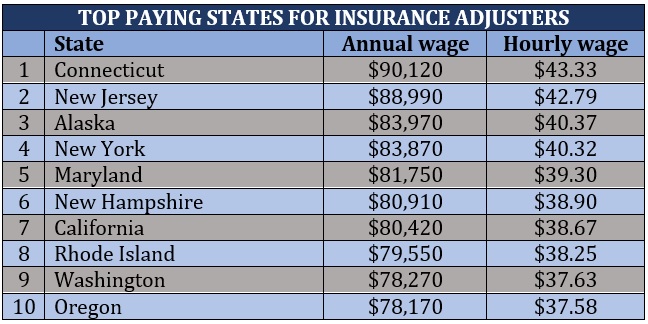
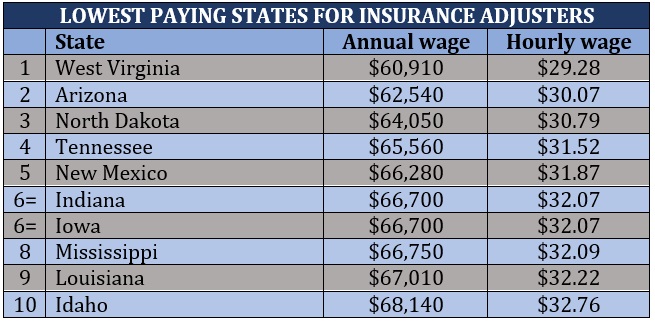
These metropolitan areas pay claims adjusters the most and the least. Check out the figures below to find out how much insurance adjusters are paid in these areas.
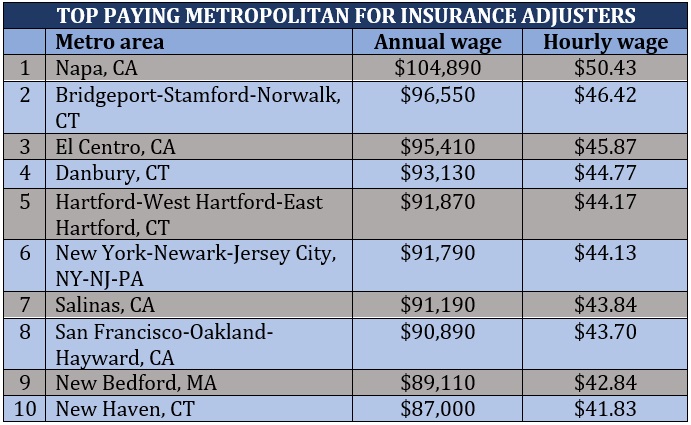
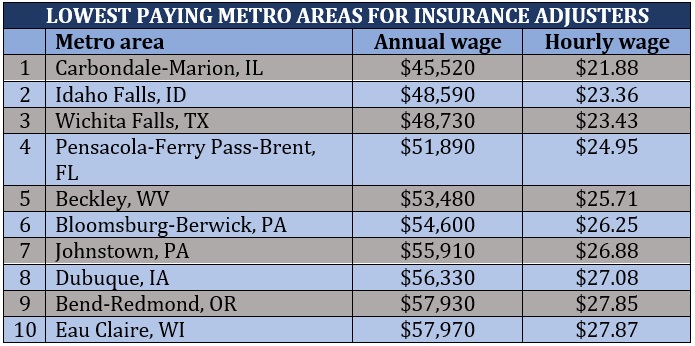
If you’re wondering how much insurance adjusters make outside the big cities, the tables below reveal the estimated median salaries in the highest and lowest-paying non-metropolitan areas.
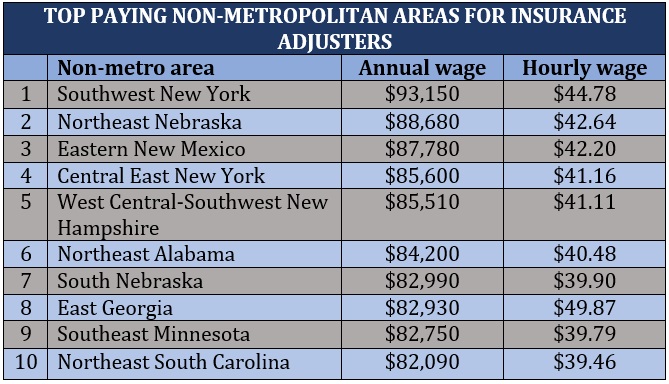
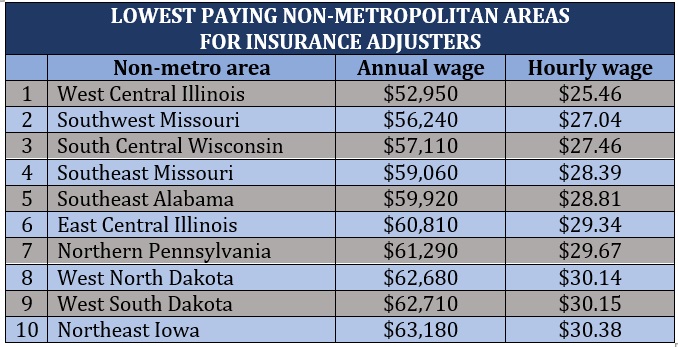
Insurance adjusters play a crucial role in the settlement of a claim. If you want to know how the whole process goes, our comprehensive guide on insurance claims filing and processing can help.
If you’re planning to pursue a career as an insurance adjuster or you want to move to a different role within the profession, you have several options. This employment website ranks the highest-paying insurance adjuster roles. Here are the top 10.
|
TOP-PAYING INSURANCE ADJUSTER JOBS |
|||
|
Rank |
Job/Role |
Annual salary range |
What they do |
|
1 |
Auto damage estimator |
$50,000 to $114,000 |
Inspect vehicle damage after an accident to determine what repairs are needed |
|
2 |
General adjuster |
$96,500 to $100,000 |
Assesses incidents to determine an insurance company’s financial liability |
|
3 |
Independent insurance adjuster |
$74,000 to $92,000 |
Usually employed by independent adjusting firms, they are contracted to handle claims from several insurers |
|
4 |
Casualty claims adjuster |
$80,000 to $88,500 |
Evaluates and settles claims related to property damage, injuries, or other losses, excluding life/health insurance claims. |
|
5 |
Field adjuster |
$72,500 to $86,500 |
Travels to the place of a claim to assess the damage, as opposed to a desk adjuster |
|
6 |
Property field adjuster |
$65,500 to $85,000 |
A field adjuster that specializes in property claims |
|
7 |
Bodily injury adjuster |
$66,500 to $81,000 |
Handles claims that have resulted in physical injury |
|
8 |
Property claims adjuster |
$52,500 to $78,500 |
Inspect and assess damage to property, including those in residential and commercial buildings |
|
9 |
Material damage appraiser |
$43,000 to $61,000 |
Evaluates and settles insurance claims by assigning appropriate values to damaged items |
|
10 |
Auto damage trainee |
$48,000 to $54,000 |
Trained to specialize in auto body damage, determine a repair estimate, and process insurance claims |
An insurance adjuster is just one of the several careers in the industry that has a high earning potential. You can check out our latest rankings of the highest-paying insurance careers by clicking the link.
Insurance adjusters are industry professionals responsible for assessing and investigating claims to determine how much or if an insurance company should pay for the losses and damages. The table below lists down the main duties and responsibilities of a claims adjuster, according to the BLS’ website.
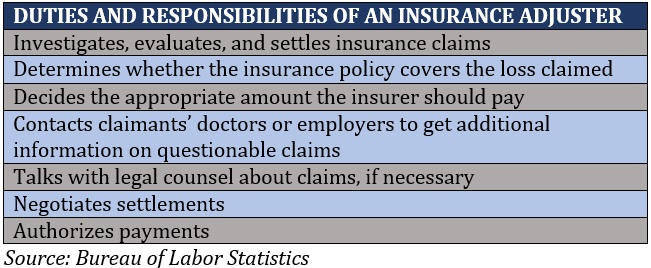
A claims adjuster should also ensure that the claims made are not fraudulent. If you want to know the lengths at which some people go to commit such crimes, you can check out our latest rankings of the worst insurance fraud cases of all-time.
As mentioned earlier, there are three main types of insurance adjusters. These are:
However, there are also several sub-categories under these classes, including:
Desk adjusters, also known as inside adjusters, work in offices. They handle claims using their computers by information, including images, send to them by policyholders. Field adjusters, meanwhile, go to the center of the action. They travel to where the damage occurred, interview people there, take pictures, and assess the damage firsthand.
Catastrophe adjusters, also called CAT adjusters, are tasked to handle large-scale calamities, and are often deployed to disaster zones to work on the claims. Given that these professionals work extremely long hours, with each assignment lasting weeks to even months, and face brutal conditions, they are also among the highest-paid adjusters.
Daily claims adjusters, on the other hand, handle claims resulting from losses that can happen in our everyday lives, including clogged toilets, grease fires, and burglary.
Insurance jobs will always be in demand as long as people need financial protection – and insurance adjusters will be among the most sought-after professionals, especially with the important role they play in the settlement of claims.
A quick online search for insurance adjuster vacancies can yield hundreds, if not thousands, of job results. This can be overwhelming and tedious to sort through. To make the job-hunting process easier for you, we have listed down the best insurance websites to search for insurance jobs. Click on the link and jumpstart your insurance career today!
Working as a claims adjuster can be extremely stressful for a number of reasons.
A claims adjuster should have empathy and understand that their clients will have varying financial situations and needs. Most claims adjusters will likely handle a lot of different cases at the same time, with varying circumstances.
It takes time and effort to analyze cases. Claims adjusters must make sound decisions quickly and work under tight deadlines.
As accidents can happen at any time, claims adjusters may also have to work outside of regular office hours. They might even have to work on holidays, so they’re usually on an on-call basis.
The number of claims adjusters is expected to decline by 6% from 2021 to 2031. As of May 2021, the median wage is set at $65,080 per year for claims adjusters.
According to data from the US Bureau of Labor Statistics, about 19,000 claims adjusters will exit the industry. Reasons vary, such as shifting careers or going into retirement.
Despite the loss of these claims adjusters, another 23,200 claims adjuster jobs will be available for that ten-year period.
Yes. There’s a lot of paperwork involved when making a claim – it can be tedious. Although these days, there are tech companies that make claims processing a lot easier.
A claim adjuster investigates any insurance claims made on clients’ insurance policies. They are responsible for finding out:
What does a typical day in the life of an insurance claims adjuster look like? Find out here and see if it's a career you'd want to pursue! pic.twitter.com/TDctgIedxq
— Insurance Relief (@InsuranceRelief) August 15, 2023
Claims adjustment is an integral part of fulfilling the obligations of an insurance company to its clients or policyholders. This is the process where coverage, legal liability, claim costs, and claim settlement are determined by the claims adjuster.
In a nutshell, this is the insurance company’s main business activity and the service that the company is contractually obligated to deliver.
A claims adjuster has to do a number of tasks to carry out their job. As employees of the insurance company that’s paying for the claim, claims adjusters must review the incident thoroughly. They should use the information gathered to make an estimate that’s as accurate as possible for the claims payment.
In a sense, the claims adjuster does the work of a private investigator. They may have to review police reports, get details about the incident from witnesses, interview anyone who was injured, and inspect the damage done to insured properties.
The top qualities that make for a good claims adjuster are objectivity and analytical thinking.
Objectivity is important for a claims adjuster to be good at their job. This is necessary to decide on aspects of a claim based on facts without the taint of personal biases or opinions.
Analytical thinking is needed to accurately determine the cost of the loss or damage and to arrive at the right amount for claims settlement.
Another very important but sometimes ignored skill for a claims adjuster is communication. Claims adjustment usually means getting information by talking to all sorts of people and being articulate enough to write detailed reports.
The top three skills a claim adjuster needs to be successful are analytical skills, communication skills, and attention to detail.
Analytical skills are needed to make the most accurate and objective cost estimates when it comes to making claims for damages or injuries.
Communication skills are vital to getting the right information from witnesses or victims of an incident that caused harm or damage.
Attention to detail is very important when gathering relevant information to file a claim.
Another valuable skill is time management, since filing for claims can have tight deadlines.
As with many occupations, the job of an insurance claims adjuster has its share of pros and cons.
Most pros are that there’s excellent job security, as the demand for claims adjusters isn’t going away anytime soon.
Another advantage is ease of entry; only a high school diploma is required to start out as a claims adjuster.
A good salary is another benefit, as claims adjusters get paid a lot due to the high demand for their skills. Some travel may be necessary, so working as a claims adjuster can afford the occasional change of scenery.
As for the cons of the job, claims adjusters are usually on-call and have to inspect the scenes of accidents. This can sometimes be dangerous and unnerving.
The irregular, unpredictable hours can also make a healthy work-life balance difficult to maintain, and getting time off can prove challenging.
Some duties or tasks of a claims adjuster can include:
Their main responsibility is to thoroughly inspect and assess any damage to the property covered by the insurance policy. The claims adjuster then determines if the company is liable for the damage. Finally, the claims adjuster provides the most accurate estimate for how much the company must pay for the damage or loss.
Do you think being an insurance adjuster is a career worth pursuing? Does how much insurance adjusters make play a role in that? Share your thoughts in the comments box below.
